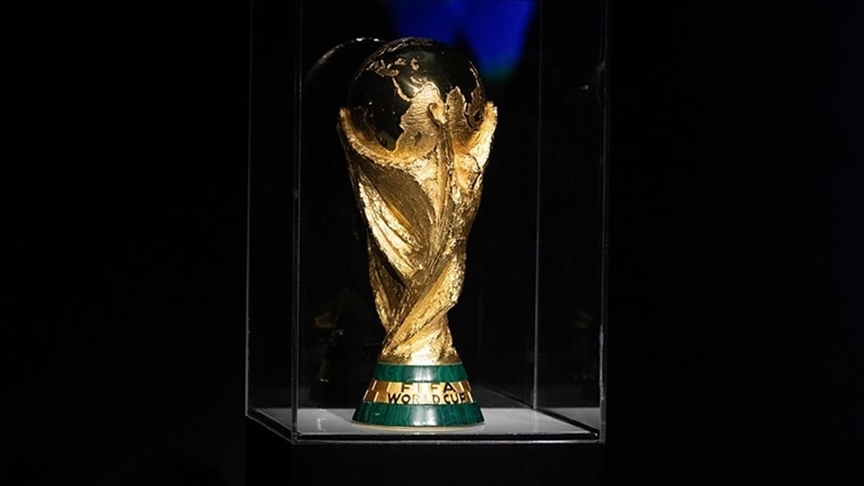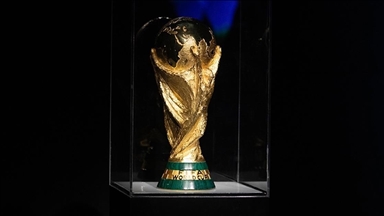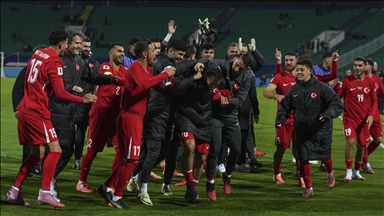OPINION - FIFA should listen to the voice of global conscience
FIFA’s firm action against Russia once offered hope for an ethically conscious sports order; its silence over Israel, however, risks marking a significant regression in moral integrity

- FIFA faces a decisive choice: it can either persist in a form of neutrality shaped by economic and diplomatic interests, or heed the global conscience and evolve into an institution that genuinely upholds ethical responsibility
- The author is an academic.
ISTANBUL (AA) - The debate over whether Israel should be excluded from the 2026 FIFA World Cup is not merely a sporting issue; it represents a crucial intersection of political, ethical, and humanitarian concerns within global sport.
The unexpected attendance of FIFA President Gianni Infantino at the Gaza Summit held in Egypt once again brought the relationship between international sport and political crises into focus. Following the summit, Infantino refrained from directly addressing whether Israel would be excluded from the 2026 World Cup, merely stating that "football cannot be part of geopolitical ambitions." While this statement sought to uphold the rhetoric of neutrality, it also reflected FIFA’s reluctance to assume moral and political responsibility.
Particularly, Spain, along with several European nations and football federations, has openly argued that Israel should be barred from international competitions due to ongoing civilian casualties in Gaza. The Turkish Football Federation has made similar appeals to both FIFA and UEFA. These calls highlight the fragile balance between the proclaimed universality of sport and the hard realities of international politics. FIFA’s past sanctions against Russia have further complicated the debate, leading many to ask: "If Russia was banned, why not Israel?"
- The historical context of relationship between sport and politics
Although modern sport is ideologically framed as a domain outside politics, history demonstrates that it has never been completely independent from political influence. From the Olympics to the World Cup, global sporting events have long served as tools of soft power and instruments of international diplomacy.
After World War II, sport was increasingly used as a diplomatic weapon within the bipolar world order. The "ping-pong diplomacy" that symbolized the US–China rapprochement in 1971 revealed the potential of sport as a diplomatic instrument. The US-led boycott of the 1980 Moscow Olympics and the Soviet bloc’s retaliation by boycotting the 1984 Los Angeles Games showed that sport had become an explicit extension of geopolitical conflict.
These historical precedents reveal the limits of sport’s proclaimed neutrality. Although FIFA formally claims to be politically independent, its decisions have repeatedly reflected political realities. The 2022 suspension of Russia following its invasion of Ukraine stands as the most recent example. Consequently, FIFA’s reluctance to adopt a similar position toward Israel has reignited debates over the institution’s consistency and credibility.
- Institutional inconsistency and the double standard critique
FIFA's hesitation in addressing the Israeli case has exposed deep inconsistencies in its decision-making processes. The organization's swift and decisive sanctions against Russia in 2022 were presented as an ethical commitment to peace and human rights. Yet, the absence of even a formal discussion of sanctions against Israel has led to widespread accusations of double standards.
When a state systematically violates international law or human rights, the inaction of sporting bodies cannot be interpreted as neutrality but as passive complicity. In the case of Russia, FIFA justified its actions as a "humanitarian reflex rather than a political decision." Failing to apply the same logic to Israel, therefore, creates a severe legitimacy crisis.
- Pressure from states and football federations
The devastation and civilian casualties in Gaza have sparked strong reactions across multiple layers of the international community. European countries such as Spain, Norway, Ireland, and Belgium have urged FIFA and UEFA to impose sanctions on Israel, while Türkiye has openly supported these initiatives. UEFA has announced plans to hold a special session to discuss the issue.
Recently, the United Nations rapporteurs issued a written statement declaring: "In response to the ongoing genocide in the occupied Palestinian territories, we call upon FIFA and UEFA to suspend Israel as a national team from international football."
Conversely, countries such as Germany and the United Kingdom have expressed concerns about turning sport into a political weapon. They insist that football must remain insulated from geopolitical disputes. This divergence of opinion has created a sharp divide even within Europe. Yet, this debate underscores that sport is not merely a field of competition but also a platform where values are contested and displayed. Human rights, ethical responsibility, and international law have imbued sport with profound political meaning that extends beyond the pitch.
- A comparative perspective: The case of Russia
FIFA's 2022 suspension of Russia was hailed as a "historic decision" by many observers. The justification cited "serious violations of international law" and "the protection of peace." However, despite similar allegations regarding Israel’s actions in Gaza, FIFA has been reluctant to take comparable measures.
This discrepancy reinforces the perception that FIFA’s ethical framework is situational rather than principle-driven. The Russian precedent demonstrated that sport can serve as an active agent in the international political arena. Yet, FIFA’s silence regarding Israel’s actions undermines the moral coherence of global sports governance. This inconsistency not only erodes FIFA’s institutional legitimacy but also challenges the broader notion of sport as a universal moral language.
- Conclusion
The debate surrounding Israel’s potential exclusion from the 2026 FIFA World Cup represents far more than a matter of tournament logistics. It is a test of whether global sport can uphold ethical responsibility in the face of political pressure. FIFA’s principle of “political neutrality,” while appealing in theory, cannot be sustained in practice when confronted with systemic injustice and human suffering. The organization’s decisions reflect not only the state of football but also the moral climate of global governance.
If sport is to remain a true representation of universal values, neutrality must be redefined through the lens of justice and human rights. FIFA’s firm action against Russia once offered hope for an ethically conscious sports order; its silence over Israel, however, risks marking a significant regression in moral integrity.
Ultimately, FIFA faces a decisive choice: it can either persist in a form of neutrality shaped by economic and diplomatic interests, or heed the global conscience and evolve into an institution that genuinely upholds ethical responsibility.
*Opinions expressed in this article are the author's own and do not necessarily reflect Anadolu's editorial policy.
Anadolu Agency website contains only a portion of the news stories offered to subscribers in the AA News Broadcasting System (HAS), and in summarized form. Please contact us for subscription options.




